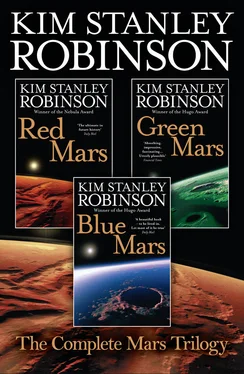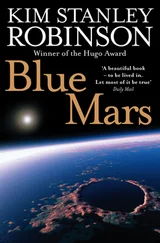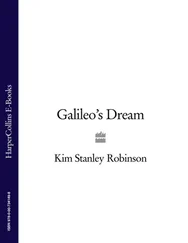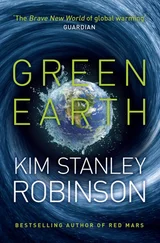Sax’s helmet tilted quizzically. “Maybe,” he said. “A little of it, anyway. But it would be hard. Let me think about it some.”
Saxifrage Russell. The perfect Phlegmatic.
The really useful part of mapping the four temperaments onto the semantic rectangle was that it immediately suggested a number of basic structural relationships between them, which then helped Michel to see their attractions and antagonisms in a new light. Maya was labile and extraverted, clearly choleric, and so was Frank; and both of them were leaders, and both were quite attracted to the other. Both being choleric, however, there was a volatile and essentially repellent aspect to the relationship as well, as if they recognized in each other exactly what they didn’t like in themselves.
And thus Maya’s love for John, who was clearly sanguine, with an extraversion similar to Maya’s but much more emotionally stabile, even to the point of placidity. So that most of the time he gave her great peace, like an anchor to reality – which then occasionally rankled. And John’s attraction to Maya? The attraction of the unpredictable, perhaps; the spice in his hearty bland happiness. Sure, why not? You can’t make love to your fame. Even though some people try.
Yes, there were a lot of sanguines in the first hundred. Probably the psychological specs for selection to the colony preferred the type. Arkady, Ursula, Phyllis, Spencer, Yeli … Yes. And stability being the most preferred quality for selection, there were naturally a lot of phlegmatics among them as well: Nadia, Sax, Simon Frazier, perhaps Hiroko – the fact that one could not even be sure about her tended to support the guess – Vlad, George, Alex.
Phlegmatics and melancholics would naturally not get along, both being introverted and quick to withdraw, and the stabile one put off by the unpredictability of the labile; so that they would withdraw from each other, like Sax and Ann. There were not many melancholics among them. Ann, yes; and probably by the fate of her brain’s structure, although it did not help that she had been mistreated as a child. She had fallen in love with Mars for the same reason that Michel hated it: because it was dead. And Ann was in love with death.
A few of the alchemists were melancholics as well. And, unfortunately, Michel himself. Perhaps five all told. Along both axes they had been selected against, as neither introversion nor lability had been considered desirable by the selection committee. Only people quite clever at concealing their real nature from the committee could have slipped through, people with great control over their personas, those larger-than-life masks that conceal all the wild inconsistencies within. Perhaps only a certain kind of persona had been selected to the colony, with a wide variety of persons behind it. Was that true? The selection committees had made impossible demands, it was important to remember that. They had wanted stabiles and yet they had wanted people who cared about going to Mars so passionately and monomaniacally that they would devote years of their lives to achieving the goal. Was that consistent? They wanted extraverts and they wanted brilliant scientists who necessarily had had to dive deep into solitary study for years and years. Was that consistent? No! Never. It went on like that all down the list. They had created double bind after double bind, no wonder the first hundred had hidden from them, had hated them! He recalled with a shudder that moment in the great solar storm on the Ares when everyone had realized how much lying and hiding they had had to do, when they had all turned and stared at him with all that pent-up fury, as if it were all his fault, as if he were all psychology, and had concocted the criteria and conducted the tests and made the selections all by himself. How he had cringed at that moment, how alone he had felt! It had shocked him, frightened him, so much that he had not been able to think fast enough to confess that he too had lied, of course he had, more than any of the rest of them!
But why had he lied, why?
This was what he could not quite recall. Melancholia as a failure of memory, an acute sensation of the irreality of the past, its non-existence … He was a melancholic: withdrawn, out of control of his feelings, inclined to depression. He shouldn’t have been chosen to go; and now he could not remember why he had fought so passionately to be chosen. The memory had gone away, overwhelmed perhaps by the poignant, aching, fragmented images of the life he had lived in the interstices of his desire to go to Mars. So minuscule and so precious; the evenings in the plazas, the summer days on the beaches, the nights in women’s beds. The olive trees of Avignon. The green flame cypress.
He found he had left the Alchemists’ Quarter. He was at the foot of the Great Salt Pyramid. He stepped slowly up the four hundred stairs, putting his feet carefully on the blue no-slip pads. Each step gave him a wider view of Underhill Plain, but it was still the same sere and barren rockpile, no matter how large it got. From the square white pavilion at the pyramid’s summit one could just see Chernobyl, and the spaceport. Other than that, nothing. Why had he come to this place? Why had he worked so hard to get here, sacrificing so many of the pleasures of life, family, home, leisure, play … He shook his head. So far as he could recall, it had simply been what he had wanted to do, the definition of his life. A compulsion, a life with a goal, how could you tell the difference? Moonlit nights in the fragrant olive grove, the ground dotted with small black circles and the electric warm brush of the mistral rustling the leaves in quick soft waves, flat on his back, arms spread wide, the leaves flickering silver and grey under the black bowl of stars; and one of those stars would be steady, faint, red, and he would seek it out and watch it, there among the windswept olive leaves; and he had been eight years old! My God, what were they? Nothing explained that, nothing explained them! As well explain why they had painted in Lascaux, why they had built stone cathedrals into the sky. Why coral polyps built reefs.
He had had an ordinary youth, moved often, lost what friends he made, went to the University of Paris to study psychology, did his degree work on space station depression and went to work for Ariane, and then Glavkosmos. Along the way got married and divorced: Françoise had said he “was not there”. All those nights with her in Avignon, all those days in Villefranche-sur-Mer, living in the most beautiful place on Earth, and he had walked about in a fog of desire for Mars! It was absurd! Worse, it was stupid. A failure of the imagination, of memory, of, finally, intelligence itself: he had not been able to see what he had had, or to imagine what he would get. And now he was paying for it, trapped on an icefloe in the Arctic night with ninety-nine foreigners, not one of whom spoke French worth a damn. Only three who could even try, and Frank’s French was worse than no French at all, like listening to someone attack the language with a hatchet.
The absence of his mind’s own tongue had driven him to watching TV from home, which only exacerbated his pain. Still he taped video monologues, and sent them to his mother and sister, so that they would send replies in kind; he watched the replies many times, looking more at the backdrops than at his relatives. He even had occasional live conversations with journalists, waiting impatiently between exchanges. Those talks made it clear how famous he was in France, a household name, and he was careful to answer everything conventionally, playing the Michel Duval persona, running the Michel program. Sometimes he cancelled consultations with fellow colonists when he was in the mood to listen to French; let them eat English! But these incidents got him a sharp reprimand from Frank, and a conference with Maya. Was he overworked? Of course not; only ninety-nine people to keep sane, while at the same time wandering in a Provence of the mind, on tree-covered steep hillsides with their vineyards and farmhouses and ruined towers and monasteries, in a living landscape, a landscape infinitely more beautiful and humane than the stony waste of this reality—
Читать дальше












